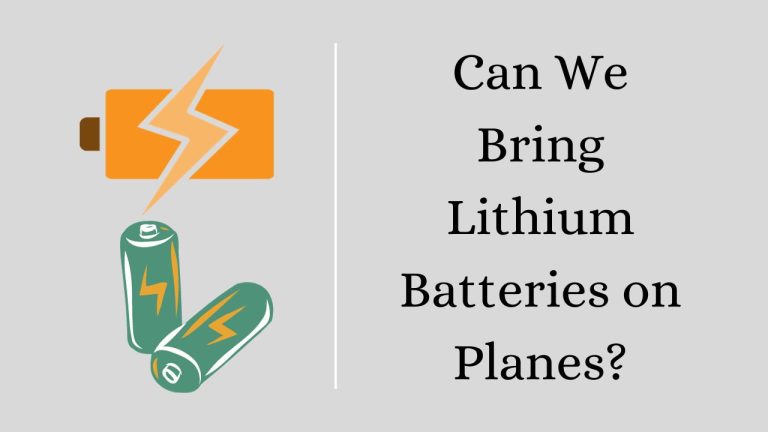In this tech-driven era, our lives are intertwined with gadgets powered by lithium batteries. From smartphones to laptops, these compact powerhouses have become an essential part of our daily routines. However, as we plan our journeys, a common question arises: Can we bring lithium batteries on planes? Let’s explore the skies and demystify the rules and regulations surrounding lithium batteries in air travel.
What is Lithium Battery?
Before we dive into the world of aviation regulations, let’s grasp the basics of lithium batteries. These batteries, known for their high energy density and lightweight properties, are widely used in various electronic devices. Lithium-ion (Li-ion) and lithium polymer (LiPo) batteries are the two main types found in our gadgets.
Carrying Lithium Batteries in Carry-On Luggage
Lithium Batteries in Carry-On
When it comes to carrying lithium batteries on planes, the general rule of thumb is to pack them in your carry-on luggage. Airlines and aviation authorities prefer these batteries to be within reach, rather than stowed away in checked baggage. This policy is in place to ensure a quicker response in case of an emergency, as lithium batteries have been known to pose a fire risk under certain conditions.
Quantity Restrictions: Limits on Battery Quantity
While you can bring lithium batteries in your carry-on, there are restrictions on the quantity allowed. The limit typically revolves around spare batteries – those not installed in devices. According to the Federal Aviation Administration (FAA) guidelines, passengers are generally permitted to carry spare lithium batteries for personal use.
Read Also: Are Selfie Sticks and Tripods Allowed on Planes?
Battery Size: Size and Watt-Hour
Not all lithium batteries are created equal, and their size and capacity play a crucial role in determining whether they are allowed on a plane. The FAA specifies limits based on the watt-hour (Wh) rating of the batteries. For example, lithium-ion batteries with a rating of up to 100 Wh are usually allowed in carry-on baggage without any special airline approval. Batteries between 100 Wh and 160 Wh may be allowed with airline approval, while those exceeding 160 Wh are often prohibited.
Here are Tips for Safe Travel with Lithium Batteries
- Keep Batteries in Original Packaging: To prevent short circuits, it’s advisable to keep lithium batteries in their original packaging or use battery cases.
- Avoid Damage: Damaged batteries can be dangerous. Ensure your batteries are not physically damaged, and cover the battery terminals with tape if needed.
- Contact the Airline: If you’re uncertain about specific regulations or have large batteries, it’s wise to contact the airline in advance. Some airlines may have their own rules or restrictions.
- Stay Informed: Regulations can change, so it’s essential to stay informed about the latest guidelines from aviation authorities and airlines.
Certain devices, such as medical equipment, may come with lithium batteries that exceed the typical limits. In such cases, passengers are usually allowed to bring these devices on board, often with specific instructions from the airline. It’s crucial to communicate with the airline beforehand to ensure a smooth travel experience.
TSA Rules and Regulations to Carry Lithium Batteries on Plane
The Transportation Security Administration (TSA) has specific rules for traveling with lithium batteries, which are commonly found in devices like laptops, cell phones, cameras, and power banks. Here’s a summary of the key points:
Batteries in Installed Devices:
- Lithium batteries with 100 watt hours (Wh) or less: These are generally allowed in both carry-on and checked baggage without any restrictions. This covers most electronic devices used by the average person.
- Lithium batteries with more than 100 Wh: These are only allowed in carry-on baggage, and you may need to check with your airline beforehand for any specific limitations or requirements.
Spare Batteries:
Lithium metal batteries: These are limited to 2 grams of lithium per battery and must be carried in carry-on baggage only. They should be individually protected from short circuits.
Lithium ion Batteries:
- 100 Wh or less: Can be carried in carry-on baggage without restrictions.
- 101-160 Wh: Requires airline approval and you can carry up to two spare batteries per person.
- More than 160 Wh: Prohibited unless approved by the airline as cargo.
Checking Batteries in Baggage
Checked Baggage Considerations
While the general preference is to carry lithium batteries in your carry-on, some circumstances may require you to check them in. In such cases, the batteries must be installed in the devices they power. However, it’s vital to note that some airlines and countries may have their own rules, so it’s best to check in advance.
Conclusion
As we soar through the skies with our gadgets and gizmos, understanding the rules surrounding lithium batteries is crucial for a hassle-free travel experience. By following airline guidelines, staying informed about watt-hour ratings, and taking necessary safety precautions, you can ensure that your lithium batteries are not only allowed on planes but also travel safely with you to your destination. So, pack your bags, charge your devices, and embark on your journey with the confidence that your lithium batteries are ready for takeoff!

